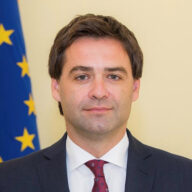Observing Russia’s elections
Whatever the electoral outcome, Putin wins. But this time, the manner of the Russian strongman?s victory will undermine not only Russian democracy; but the credibility of Europe?s democracy-promotion.

ECFR Alumni · Director, Wider Europe programme
Russian domestic and foreign policies; Eastern Partnership countries and their relations with the EU; post-Soviet conflicts; cybersecurity
English, Russian, French, Romanian
Nicu Popescu was the director of the Wider Europe programme at the European Council on Foreign Relations, and he works from ECFR’s Paris office. His topics of focus include EU’s relations with Russia and the Eastern Partnership countries.
In 2019, Popescu served as Minister of Foreign Affairs and European Integration of Moldova. Previously, he worked as a senior analyst at the EU Institute for Security Studies (2013-2018); senior advisor on foreign policy to the prime minister of Moldova (2010, 2012-2013); senior research fellow at ECFR’s London office (2007-2009, 2011-2012), and as a research fellow at the Centre for European Policy Studies in Brussels (2005-2007).
Popescu teaches at Sciences-Po Paris. He holds a PhD in International Relations from the Central European University in Budapest, Hungary. He is author of the EU foreign policy and post-Soviet conflicts: stealth intervention (Routledge 2010), and co-editor of Russia Rising: Putin’s Foreign Policy in the Middle East and North Africa (with Dimitar Bechev and Stanislav Secrieru, I.B. Tauris 2021) and Democratization in EU Foreign Policy (with Benedetta Berti and Kristina Mikulova, Routledge 2015).
Whatever the electoral outcome, Putin wins. But this time, the manner of the Russian strongman?s victory will undermine not only Russian democracy; but the credibility of Europe?s democracy-promotion.
Despite its economic strength and military might, the EU has begun to behave as if it were subordinate to an increasingly assertive Russia
Despite its economic strength and military might, the EU has begun to behave as if it were subordinate to an increasingly assertive Russia. Read ECFR's “Power Audit” of EU-Russia relations.
Russia has emerged as the most divisive issue in the European Union since Donald Rumsfeld split the European club into ?new’ and ?old’ member states. Read an opinion piece published through Project Syndicate.
The post-modern EU can learn from the medieval concept of borders